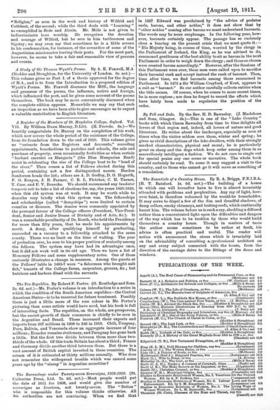A Register of the Members of St. Magdalen College, Oxford.
Vol. VII. By William Dunn Macray, D.Litt. (H. Frowde. 6s.)—We heartily congratulate Dr. Macray on the completion of his work, which now covers the whole period of the existence of the College, from its foundation down to the end of 1910. This volume gives us "extracts from the Registers and Accounts," recording appointments, benefactions to parishes and schools, the sale and purchase of property, even occasionally festivities as when certain barbari caerulei ex Hungaria " (the Blue Hungarian Band) assist in celebrating the rise of the College boat to be "head of the river." Then comes a list of Fellows elected during this period, containing not a few distinguished names. Burdon Sanderson heads the list; others are A. D. Godley, D. G. Hogarth, F. G. Kenyon, J. B. Farmer, C. R. L. Fletcher, C. H. Turner, T. Case, and P. V. Benecke. We should recommend any laudator temporis acti to take a list of elections for, say, the years 1820.1850, when this old system was at work. It may be worth while to describe very briefly what this system was. The fellowships and scholarships (called " demyships ") were limited to certain counties or dioceses. The demies were commonly appointed by the personal favour of the College officers (President, Vice-Presi- dent, Senior and Junior Deans of Divinity and of Arts, Arc.). It was a remarkable peculiarity of Dr. Routh, who held the Presidency for more than fifty years, that he made his appointments by merit. A demy, after qualifying himself by graduating, succeeded on a vacancy to a fellowship attached to the same county. There was no limit on the time of waiting. The year of probation over, ho rose to his proper position of seniority among the fellows. The system may have had its advantages once, but it did not work well in its old age. Then we have a list of Honorary Fellows and some supplementary notes. One of these curiously illustrates a change in manners. Among the guests at the Fellows' table in 1485-7 were "a fisherman who brought salt fish," tenants of the College farms, carpenters, grocers, &c.; but butchers and barbers dined with the servants.


































 Previous page
Previous page